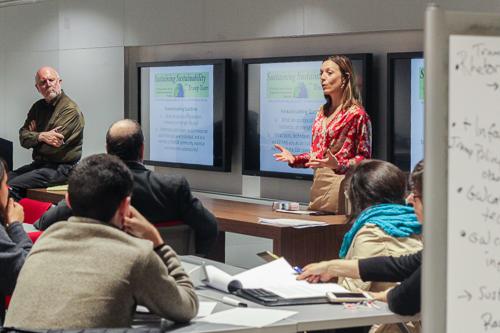
Faculty and students came together in the National Churchill Library & Center Monday evening to discuss the future of sustainability during the Trump administration.
The event, called “Sustaining Sustainability in the Trump Years,” focused on how the environmental preservation progress can be maintained under President Donald Trump, who has proposed policies that are anti-climate change.
The event was held in a workshop format, where faculty worked with students to answer critical questions about sustainability in the U.S. About 30 students participated in the workshop, including representatives from groups like GreenGW and College Democrats.
1. Effective agents of change
Michael Svoboda, an assistant professor of writing and director of the sustainability minor, opened the event by saying that it was a chance to figure out what direction the program should go in the future.
“This is mainly an opportunity for us to listen to you,” Svoboda said. “The goal is to get your impressions of what has been happening. We hope to get ideas for the kinds of things we ought to do in the programs within the University.”
Kathleen Merrigan, executive director of sustainability, followed Svoboda’s remarks and said that when she attended the Women’s March on Saturday, one sign stood out to her in particular: “Yes, you caught me sleeping, but now I’m awake. I’m marching. I’m activated.”
“Thinking about those words today now that our new president has taken office, there’s a lot of anxiety,” Merrigan said. “I think our goal is how can we as individuals and as a community be effective agents of change.”
After the opening remarks, faculty members were assigned to small groups of students to lead discussions, posing questions like, “What concerns were raised for you by the election and/or events of this weekend?” and “What tools, techniques, and resources would help you as an individual, and as a member of the GW community, maintain momentum on sustainability?”
2. ‘Your voice matters.’
After small groups concluded their discussions, one student from each group was elected to share their notes in front of the larger group.
Caroline Schiavo, a sophomore, was the first to share.
“We talked about denial of climate change with Scott Pruitt, and how we can’t take a four-year hiatus from the environment,” Schiavo said.
Schiavo also addressed a general student concern that sustainable food options on the GW campus are far from affordable.
“Whole Foods and Sweetgreen are more than students should pay for food,” Schiavo said.
Lisa Benton-Short, the chair of the geography department, said that students were more hopeful about the Trump administration than she expected.
“My one takeaway tonight was that everybody at our table was concerned about the election results and Trump agenda but they weren’t despairing,” Benton-Short said. “Some people were even motivated more with how to get involved and how to take action.”
LeRoy Paddock, associate dean for environmental studies, said that while protests can successfully bring awareness to issues like the environment, it is important to keep the ball rolling with day-to-day activism.
“Marches like Saturday can move the country, but you can’t just stop on Saturday,” Paddock said. “That has to happen on some regular basis.”
Meghan Chapple, the director of the Office of Sustainability, said that faculty and administrators are prioritizing students’ voices at GW.
“I want to emphasize how much your voice matters on campus,” Chapple said. “You feel like the University isn’t hearing you — that’s why we’re having this.”
Chapple also encouraged students to speak directly with administrators to enact change.
“Try and talk to people in Rice Hall, anything from food to compost – you’re going to get way more traction talking to people in Rice Hall,” Chapple said, referring to GW’s main administrative building.
3. Forward thinking
Frank Sesno, the director of the School of Media and Public Affairs, said that communication and journalism is at the center of sustainability advocacy.
“Our work is square in the middle of this thing right now,” Sesno said. “We need to think about how you frame the story as sustainability advocates.”
Sesno added that instilling effective change as a college student is a feasible goal.
“Social activism often begins on campuses,” Sesno said.
Svoboda, the director of the sustainability minor closed, by saying that with the new administration, the issue of sustainability in the U.S. will have to be navigated through experimentation.
“I would stress that there really aren’t known answers out there, we’re kind of off the map with what’s happening with the political divide in this country,” Svoboda said. “We’re going to have to experiment, talking to people who are willing to make themselves vulnerable to an open dialogue.”




